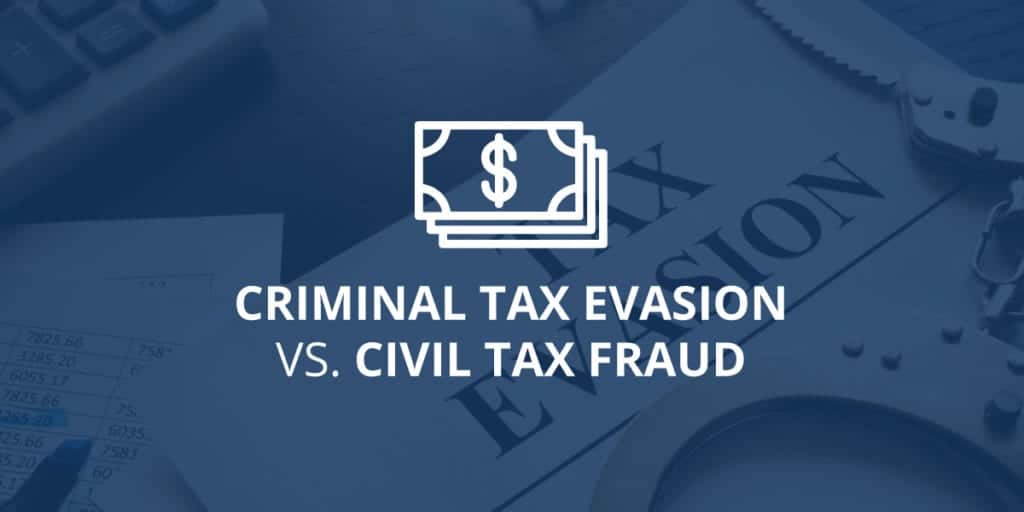
Criminal Tax Evasion vs. Civil Tax Fraud
While the federal Internal Revenue Code establishes a number of specific tax-related offenses, in broad terms, failing to pay what you owe can be described as “tax evasion” or “tax fraud.” If your tax returns are being audited, or if you are under investigation by the Internal Revenue Service (IRS), it is critical to understand the distinction between criminal tax evasion and civil tax fraud, as asserting the wrong type of defense could potentially result in exposure to fines, interest, additional financial penalties, or even federal imprisonment.
Important Similarities and Differences
As we have discussed previously, the terms “tax evasion” and “tax fraud” are often used interchangeably, and the IRS examines the same factors when deciding whether to pursue civil or criminal enforcement. These include factors such as:
- Understating taxable income
- Taking questionable deductions
- Accounting improprieties
- Destroying relevant records
- Transferring or concealing assets
- Dealing in cash
- Refusing to cooperate with the IRS
Additionally, as explained by the IRS, “willfulness” is an element of both the criminal offense of tax evasion and the civil offense of tax fraud:
“Willfulness is a major factor in establishing fraud. Willfulness is an element of both civil and criminal fraud. The definition of willfulness has evolved from court decisions and is not defined by statute. Willfulness is a state of mind, a conscious, knowing decision to do or fail to do some act. It is defined as the ‘voluntary, intentional violation of a known legal duty.’”
What, then, are the differences? The first major difference between criminal tax evasion and civil tax fraud cases is the government’s burden of proof. In order to prove criminal tax evasion, the government must be able to prove that you willfully underpaid your federal tax obligation “beyond a reasonable doubt.” In civil cases, the government’s burden of proof is lower – “clear and convincing evidence” is all that is needed to establish civil liability.
The second major difference between criminal and civil tax fraud is the severity of the penalties that can be imposed. In civil tax fraud cases, potential penalties include:
- Assessment of the correct tax amount
- Interest
- Civil fines
- Retrieval of fraudulently-transferred assets
In criminal tax evasion cases, however, potential penalties include criminal fines and federal imprisonment. Under the primary federal criminal tax evasion statute, 26 U.S.C. § 7201, anyone who is convicted of willfully evading federal income tax, “shall be fined not more than $100,000 ($500,000 in the case of a corporation), or imprisoned not more than 5 years, or both, together with the costs of prosecution.”
What Are Some Potential Defenses to Allegations of Criminal Tax Evasion and Civil Tax Fraud?
When facing allegations of underpaying federal tax, there are a number of potential defenses that taxpayers can utilize to avoid civil and criminal penalties. However, these defenses do not include claiming that your accountant or tax attorney misadvised you. In many cases, the most-effective defense strategy will involve challenging the government’s evidence of willfulness. This can be done by asserting (among other things) that:
- You were not aware that your tax returns were incorrect.
- You did not intentionally submit a false tax return.
- You lacked a “dishonest purpose” in submitting an incorrect return.
- You believed in good faith that you did not owe any additional tax.
- Your federal tax returns were correct.
Are You Facing Allegations of Tax Evasion or Civil Tax Fraud?
If you are facing allegations of tax evasion or civil tax fraud, it is important that you speak with a tax attorney immediately. To schedule a complimentary consultation at our offices in San Diego, Orange County, or El Cajon please call 619-595-1655 or contact us online now.

Leave a Reply